Mechanical Engineering
Anindya Chatterjee, PhD (Cornell University)
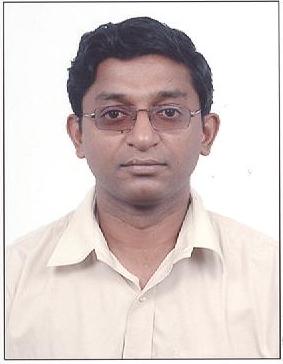 Professor
Professor
Research Interests: Nonlinear dynamics, Studies in hysteresis and material damping, Statistics of engineering test data, Vehicle dynamics and control.
Email:
This e-mail address is being protected from spambots. You need JavaScript enabled to view it.
Ph: +91-512-259-6961 (O-FB-357)
Website: http://home.iitk.ac.in/~anindya
My research interests are Nonlinear dynamics, Studies in hysteresis and material damping, Statistics of engineering test data, Vehicle dynamics and control. Some topics on which I have worked are Damping, Boats, Journal bearings, Rotor dynamics, Fatigue damage evolution, Bicycles and motorcycles, Fractional order derivatives, Nonlinear oscillations, Delay differential equations, Ion dynamics in Paul traps, Health monitoring of equipment, Passive walking machines, Rigid body impact models, Odd topics.
Anurag Gupta, PhD (Berkeley)
 Assistant Professor
Assistant Professor
Research Interests: Dynamics of Defects in Solids, Waves in Solids, Mechanics of Thin films
Email: ag[AT]iitk.ac.in
Ph: +91-512- 259-6161 (O)
Website: http://home.iitk.ac.in/~ag
Our current interest lies in using differential geometry and PDE theory to study irreversible dynamics of defects in solids. In particular, we are looking at the following problems: 1) Dynamics of incoherent boundaries within solids (e.g. grain boundaries), 2) Classification of defects in solids on the basis of geometry and group theory, 3) Surface growth in biological systems.
Arun K. Saha, PhD (IIT Kanpur)
 Associate Professor
Associate Professor
Research Interests: Turbulance, Chaos & Bifurcation, Vortex Dynamics, Hotwire Anemometry, Gas Hydrates, Experimental Fluid Dynamics and Heat Transfer, Computational Fluid Dynamics and Heat Transfer
Email: aksaha[AT]iitk.ac.in
Ph: +91-512-259-7869 (O)
Website: http://home.iitk.ac.in/~aksaha
Our research team is engaged in both computational and experimental study of incompressible fluid flow and heat transfer for various applications. For computations, both DNS (direct numerical simulation) and turbulence modeling (RANS: Reynolds Averaged Navier-Stokes, both steady as well as unsteady, LES: Large Eddy Simulations) are carried out depending on the value of Reynolds number. In experiments, Hot-wire anemometry (HWA), Laser Doppler Velocimetry (LDV), Particle Image Velocimetry (PIV), Laser Induced Fluorescence (LIF) and Infrared Thermography techniques are used to characterize the flow and heat transfer. The following pictures shows one of the images of a controlled circular jet at Re=2,000 simulated using DNS technique.
Basant Lal Sharma, PhD (Cornell University)
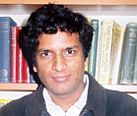 Assistant Professor
Assistant Professor
Research Interests: Continuum Mechanics and Thermodynamics, Lattice Dynamics, Dislocations and Solid-Solid Phase transformation
Email: bls[AT]iitk.ac.in
Ph: +91-512-259-6173 (O-FB356)
Website: http://home.iitk.ac.in/~bls
In very general terms, my research interests concern problems that arise in continuum mechanics. I am interested in studying the phenomena that occur due to the presence of small length scales, for example, the length scales involved in the description of the structure of a crystal.
Ishan Sharma, PhD (Cornell University)
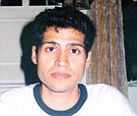 Assistant Professor
Assistant Professor
Research Interests: Mechanics of Granular media, Planetary science.
Email: ishans[AT]iitk.ac.in
Ph: +91-512-259-6152(O)
Website: http://home.iitk.ac.in/~ishans
I am interested in mechanics. In both its theoretical and applied incarnations. At present I am involved with planetary science/geophysics, contact mechanics, granular aggregates, and a few other random mechanics problems.In planetary science/geophysics, I am interested in applying continuum mechanics to better understand how natural bodies/phenomena behave/occur. The realization that most planetary objects seem to consist mostly of soil got me interested in studying the response of granular aggregates. This, and a strong desire to be useful has led me to study segregations processes, especially in industrial machines. I am also interested in contact mechanics, especially in developing tools to model and solve adhesive contact of thin films, with application to material testing, interpreting AFM results, developing newer adhesives, etc. Finally, I am a mechanics junkie, and am attracted to almost anything governed by the laws of Newton and Euler. Especially, if there is an industrial or geophysical context.
P. Venkitanarayanan, PhD (U of Rhode Island)
 Associate Professor
Associate Professor
Research Interests: Experimental Solid Mechanics, Dynamic Fracture Mechanics, Functionally Graded Composites.
Email: venkit[AT]iitk.ac.in
ph: +91-512-259-7528(O)
Website: http://home.iitk.ac.in/~venkit
Our recent research is focused on three areas as listed below. Understanding the fracture behavior of materials in which there are property gradients. Currently we are looking at the effect of both elastic and toughness variation along the crack front on the stability of stationary cracks in layered systems. Both analytical and experimental techniques are employed to meet this objective. Subsequently the behavior of fast propagating cracks in these systems will be investigated. Observing in real-time the fracture processes at microscopic scale in polymers and make measurements of the local strain and displacement fields. This information will be used to develop models that can represent the fracture processes and eventually predict the fracture behavior of bulk polymers (with Dr. S. Basu). Investigate the effect of strain rate on the compressive strength and failure patterns of hard ceramics, when subjected to highly dynamic short duration loading (50-100 microseconds) using the Hopkinson bar technique combined with ultra high-speed imaging.
Pankaj Wahi, PhD (IISc Bangalore)
 Assistant Professor
Assistant Professor
Research Interests: Non linear dynamics, Vibrations
Email: wahi[AT]iitk.ac.in
Ph: +91-512-259-6092(O)
I work mostly in the area of nonlinear dynamics and control. Most of the applications are derived from engineering examples but some come from biology, ecology, economics as well as music. The work focuses on trying to unravel the fundamental unifying connections between the various examples of nonlinearities observed in nature. These diverse problems are modeled using various classes of functional differential equations like delay differential equations, fractional derivatives as well as partial or sometimes ordinary differential equations. The current emphasis is on understanding the natural dynamics of these systems so that they can be exploited in developing more efficient control systems.
Prakash M. Dixit, PhD (Minnesota)
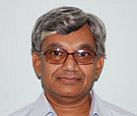 Professor & Head of Mechanical Department
Professor & Head of Mechanical Department
Research Interests: Metal Forming, Ductile Fracture, Elasto-plastic Impact / Contact Problems and Finite Element Method
Email: pmd[AT]iitk.ac.in
ph: +91-512-259-7094(O-FB360), +91-512-259-7775 (O-Nuclear Bldg.)
Website: http://home.iitk.ac.in/~pmd
Metal Forming (Drawing/Extrusion, Rolling, Forging, Deep Drawing): Mathematical Modelling, Residual Stresses, Anisotropic Effects, Defect Prediction, Optimal Die Profile, Temperature and Lubrication Analysis, Application of Fuzzy Set Theory in Mathematical Modelling. Large Deformation Elasto-Plastic Impact/Contact Problems, Ductile Fracture: Continuum Damage Mechanics Model, Finite Element Method
Shakti S. Gupta, PhD (Virginia Tech.)
 Associate Professor
Associate Professor
Research Interest: Linear/Nonlinear Structural Mechanics, Mechanics of Nanomaterials and their Characterization using Molecular Simulations
Email: ssgupta(AT)iitk.ac.in
Ph: +91-512-259-6110 (O)
Website: http://home.iitk.ac.in/~ssgupta
Our group is investigating several interesting problems related with mecanics at nano-scale. Some of these are; appicability of non-local continuum field theories to understand saturation of frequencies in single-walled carbon nanotubes found in our molecular mechanics simulations, non-linear vibrations of single-layer graphene sheets, development of equivalent continuum structures of nanotubes and graphene sheets etc. Visit 'Highlights' link shown on the left.
Shantanu Bhattacharya, PhD (U of Missouri, Columbia)
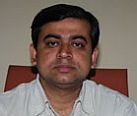 Assistant Professor
Assistant Professor
Research Interests: Bio MEMS, Lab on Chip, Nano Technology, Microsystems Fabrication and MicroFluids.
Email: bhattacs[AT]iitk.ac.in
Ph: +91-512- 259-6056 (O)
Website: http://home.iitk.ac.in/~bhattacs
We are in the process of developing a Microsystems fabrication laboratory and a team of researchers with the overall goal of being able to do cutting edge research in the areas of BioMEMS, Lab on a chip and Microfluidics based approaches to diagnose and detect clinical samples etc. We also evaluate the various Nano-technological approaches to synthesize smart materials which would be able to perform rapid sensing of gases, biological agents, physical parameters like temperature, pressure, explosions and combustion at the nanoscale with novel nanoenergetic materials etc. and interface these technologies with Microsystems. The vision of our research is to work in interdisciplinary areas of engineering and Life sciences and also to develop a team of researchers and workforce of the 21st century who can walk easily into a variety of domains of science and technology.
Sovan Lal Das, PhD (Cornell University)
 Assistant Professor
Assistant Professor
Research Interest: Mechanics of Biological Membranes, Vibration and buckling of shells, Waves in tires.
Email: sovandas[AT]iitk.ac.in
Ph: +91-512- 259-7035(O)
Website: http://home.iitk.ac.in/~sovandas
Biologists and biophysicists have long been intrigued by bio-membranes that not only isolate cells and their internal compartments from one another, but also are important for the functionality of cells. However, due to the complicated nature of the cell membrane and the sizes of rafts being on nanometer-scale, it is extremely hard to conduct a systematic investigation. A simpler system in which the physical and chemical properties of lipid assembly can be studied is the bilayer membrane of a vesicle. Of particular importance and relevance to cell biology are the Giant Unilameller Vesicles (GUVs) with coexisting liquid ordered (lo) and liquid disordered (ld) domains. Currently, we are investigating various mechanical aspects of a membrane that influence cell functionality using GUV as a model system. The examples include: (1) influence of membrane curvatures on binding of certain proteins to lipid bilayer membrane and vice versa (with Dr. T. Baumgart), (2) Adhesion of multi-component membranes and effect of substrate geometry (with Prof. Q. Du), (3) Size sorting high deformable objects like lipid bilayer vesicles on a wrinkled substrates (with Dr. A. Ghatak), (4) Motion, interaction and growth of domains in vesicle membranes.
Sumit Basu, PhD (IISc Bangalore)
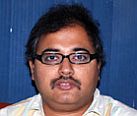 Associate Professor
Associate Professor
Research Interests: Computational Micromechanics, Fracture Mechanics, Modelling of Materials across length scales, Finite deformation theories and Non-linear FEM.
Email: sbasu[AT]iitk.ac.in
Ph: +91-512-259-7506 (O)
Website: http://home.iitk.ac.in/~sbasu
We work in the broad area of computational materials science. This involves understanding the deformation and fracture behaviour of different classes of materials or material combinations under practically relevant loading situations. We use simulation tools ranging from non-linear Finite Element methods and meshfree techniques to classical Molecular Dynamics.A large part of our efforts are directed towards identifying links between the molecular architecture of amorphous glassy polymers and polymer blends to their macroscopic mechanical and thermal properties, ageing behaviour as well as fracture micromechanisms like crazing. We have recently started on in-situ electron microscopic studies (in collaboration with Dr P Venkitanarayanan's group) of fracture in polymers with a view to better understand the micromechanics of their failure. In collaboration with Dr N Nair (of Chemistry, IITK) we are in the process of devising techniques to better inform our classical MD codes with architectural details of the polymers we are studying. We also work on polymer matrix nanocomposites and treat them as systems within which many of the idealised 'toy' simulation situations like polymers confined between rigid walls, interactions between polymer chains and an inorganic substrate etc. shed their 'academic' garb and attain important practical significance. These include polymer nanocomposites with surface modified nano-spheres as well as nanotubes. Defect controlled yielding and plasticity in metals, enriched continuum models embedding experimentally calibrated interface behaviour and interactions between electrostatic fields and soft solids and simulation of fracture (basically shattering) of solids under ultra-high strain rates are the other areas where we are working actively with various other groups (Dr S Sangal MME IITK, Dr M S Bobji, ME IISc Bangalore, Dr N Gupta, EE, IITK, Dr J Sarkar, ChE, IITD). The group presently has 9 PhD students and collaborates actively both within and outside IITK. Several projects centred around the topics mentioned above have been completed and are being pursued. Industries like Danone, GE Research and Boeing have worked with us actively. We work with the broad philosophy that better understanding of the multi-faceted physics of deformation and fracture at various scales may obviate the need to perform huge, expensive simulations. Also, understanding at various length and time scales may not always fit with each other seamlessly but merely provide pointers that inform and provide better parametrisation of models at higher scales. In other words, parametric models ('glorified curve fits') are here to stay; the parameters however, need flesh and blood.
